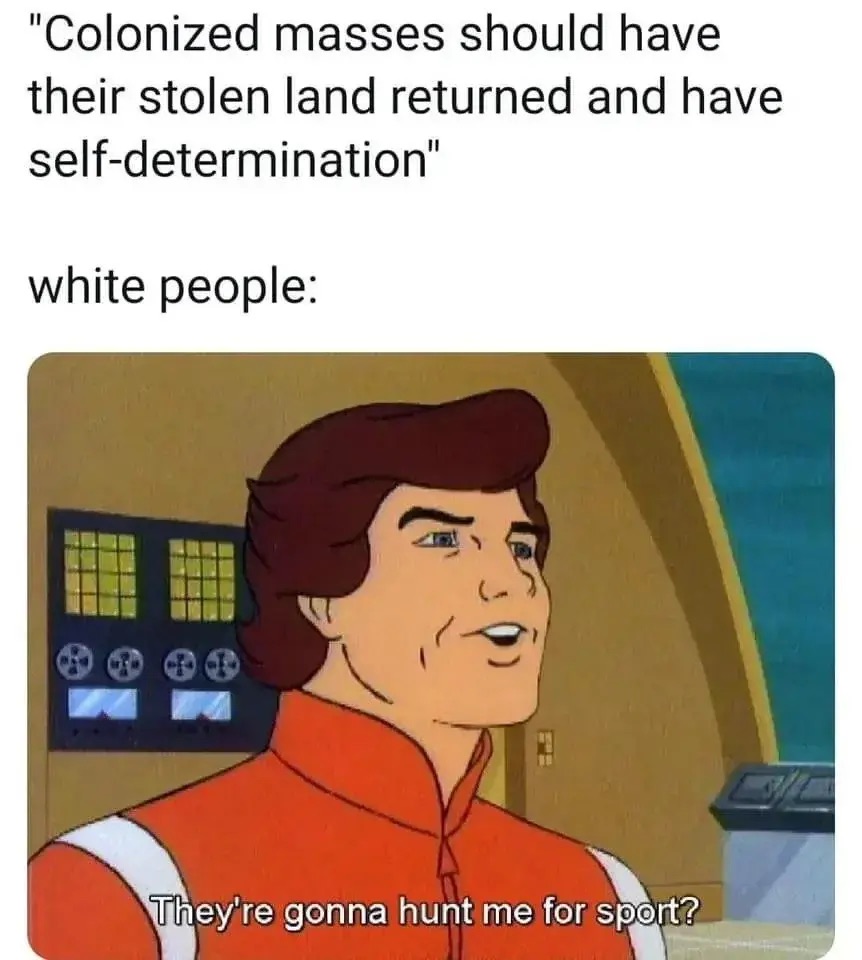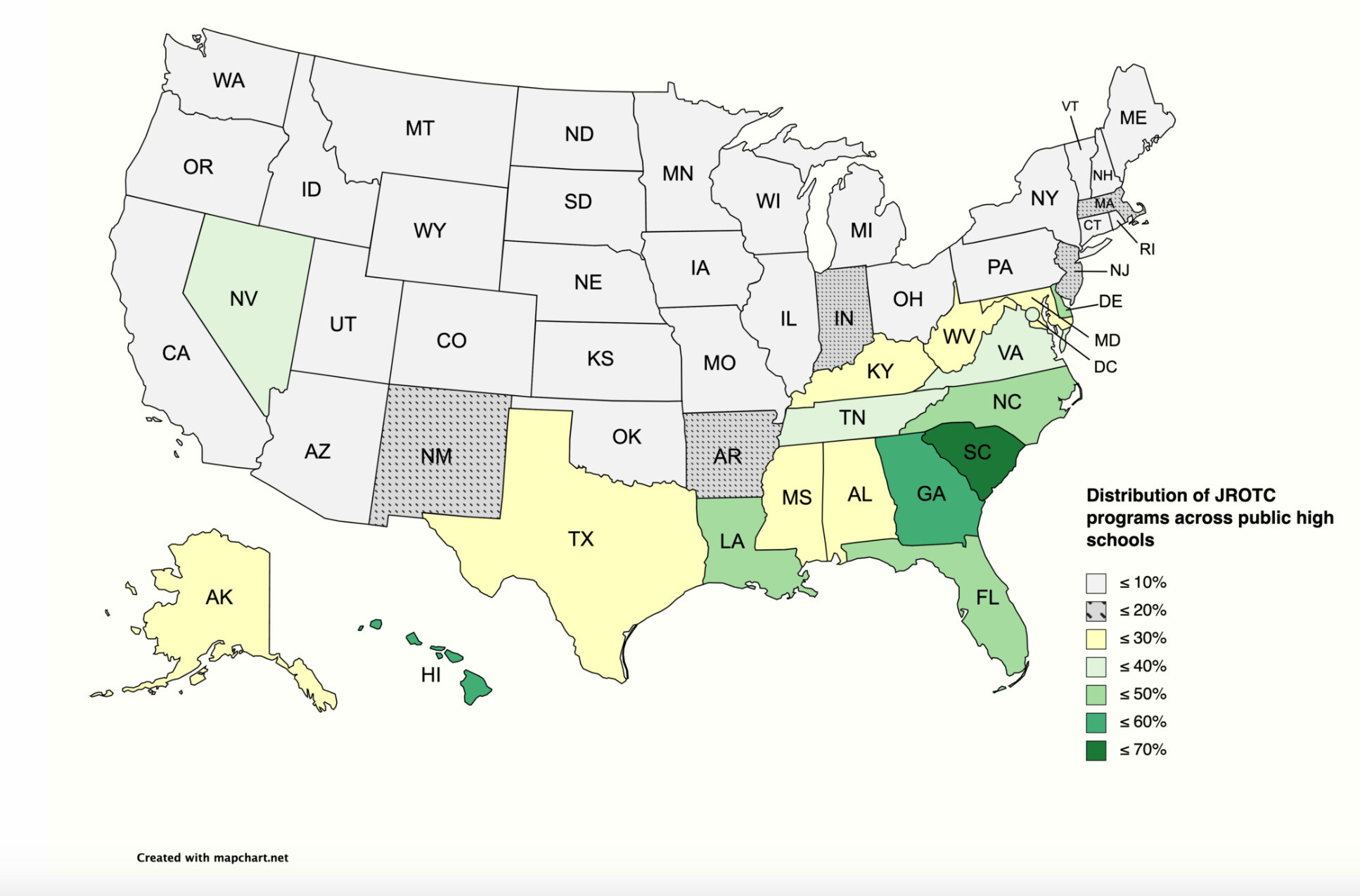Hey all,
I'm currently developing a Marxist-Leninist analysis of settler colonialism, especially in light of the situation in Palestine, and am going to read Settlers: The Mythology of the White Proletariat by J. Sakai for the first time. Before I do I was just curious what other comrades think of the book and its analysis? It seems a pretty controversial text among many online Marxist groups, to whatever extent that matters, but as an Indigenous communist I feel having a clear and principled stance on the settler question is important for all serious communists. I'm not sure if I'll agree with Sakai specifically, but since I generally agree with the opinions of y'all, I was curious as to your thoughts on the book.
It is fantastic as a revolutionary anti-racist, anti-imperialist history of the US Empire. I recommend it to virtually everyone on those grounds. However, his ideological basis is heavily informed by the widespread pessimism that followed the collapse of the US New Left anti-colonial struggles of internally oppressed nations (as Sakai characterizes). He embraces a brand of Third Worldism whose main practical application is to give up on revolutionary activity in the imperial core, since all workers are labor aristocrats who benefit more from imperialism than they are exploited by Capitalism.
While the degree of exploitation of workers in the imperial core is unquestionably lower, while White workers unquestionably benefit immensely from racism, we cannot accept defeat as a given.
The primary contradiction in the world is between Imperialist Nations and Colonized Nations. "Leftists" in the imperial core cannot wait for the comrades in the Global South to liberate themselves, we must be active strugglers for their liberation and our own. We must believe revolution is possible to hold any attitude other than 'lie down and rot'.
Also watching white people squirm reading is really fun. A comrade's conservative, racist sibling has possibly the only actual 'SJW Marxist Professor' in the US who is making the class read it. The comrade has been giving us updates on the growth of their sibling's growing guilt and political conciousness.
Read Settlers!
The pessimism makes more sense given the context of the time it was written in. I've heard Gerald Horne's Counterrevolution series described by some as a more contemporary analysis that succeeds Settlers.
I think the controversial rap the book gets is due more to its more dogmatic followers. Like a lot of maoists/third worldists, they have accurate observations but draw questionable conclusions from them.
It's definitely a justifiable pessimism at the time, but that doesn't make it correct or currently applicable.
According to you, maybe. From where I sit, the decade's watchphrase has been "second, third, fourth, and fifth-through-tenth verses, same as the first"; where the first verse was the failure of Reconstruction. For 100+ years, settlers have done us the dirtiest(right behind to the damn-near-totally-extincted tribes of the Indigenous if I'm honest), and it doesn't appear to be changing its intensity, just its manifestations. So... Why isn't that pessimism applicable?
Because we have to believe in something if we are going to escape the climate crisis as a species. We are capable of success as the US empire crumbles and comrades wake up to decolonial thought. We all need to be involved in some kind of organizing, whether it be international solidarity or building dual power.
You're not wrong for the need for some kind of belief; but I don't apply mine to some rosy ideal that after all that's been done, after 200 years of slavery and dehumanization, and then 200 more years of even more abuse, marginalization, and oppression (but legal under the constitution and bill of rights this time!), we're somehow going to find a way to put all that behind us and skip merrily, arm-in-arm into the sunset. I apply my belief and optimism to the idea that one day, we'll have a nation of our own, carved out of the guts of Amerika, hand in hand with our indigenous comrades. I have none for those who descended from this nation's original settlers. My organizing is explicitly with the colonized.
I constantly watch the descendants fail to put their bodies on the same wheels and gears we're forced to put our bodies on, day in and day out. I see them let Black bodies get slabbed out by pigs. I see them let Black children get stripped of their mothers and fathers, their parents condemned to carceral slavery, and those children mandated to a foster pipeline that will inevitably see them in the same prisons, likely abused into antisocial behavior-sets beforehand. I see them let Black would-be professionals get stripped of their inroads to the same successes that the whites are practically hand-gifted.
You'll have to forgive me for not putting my faith in any of that; because I don't see the settlers en masse adopting decolonial thought. The sheer vast weight of Amerikan cognitive dissonance will break at least (there was a much more harsh percentage here. Being charitable, we'll say 'half') of them before they get there. I don't see a society I want to be a part of in the settlers anymore, or that I'd want my family and community a part of; even if we assume the descendants were able to unlearn everything they've been taught.
Speaking as Latino person, that hope is one of the only things that keeps me alive. And in a slightly dark but bright side-ish way, we don't need every settler to adopt decolonial thought. Just enough to have an army.
And even then, we won’t be the only army. We will have international allies (including victims of Amerikkan imperialism on this continent and abroad).
I totally agree, I just think it’s best to avoid pessimism. “Pessimism of the mind, optimism of the will” and all that.
Very valid; I just had to explain the method behind what some would no doubt see as madness. You've tended to have a fairly level head on your shoulders as long as I've seen you post.
To me, pessimism is defeatist and essentialist. It seems to state that the current principle contradiction within settler society (anti-Blackness) is insurmountable. I agree, anti-Blackness is inherent to the US settler civilization but I have to believe that that civilization can be overcome in order for revolutionary work to be possible. It is not likely in the short-term, but to me you have to believe something is possible in order to struggle for it.
One of the best books I've ever read, makes crackers so uncomfortable.
It's not like the book says send whitey back to Europe, just that they as a settler class have no vested interest in decolonizing. It's not that controversial imo but I'm Black and also Indigenous so 🤷🏿♂️ spoke to me just fine
I don't have any native in me as far as I know; but considering the trail for my geneaology disappears after the 1890s, it's totally in the air as to who and what. And yeah, same situation as you-- spoke to me just as seamlessly as Wretched of the Earth or We Will Shoot Back. (Which, if you don't have that latter one, it's by Akinyele Omowale Umoja; Black Agenda Report put me onto it a few months back.)
As for OP-- I don't expect anyone to really agree 100% with Settlers, but I've read it cover-to-cover like twice now, with a third coming up the next time I have a good, long break. It's controversial because one, Sakai published under pseudonym and that's enough to make naive, non-opsec minded 'comrades' shit their britches. Two, Sakai was maybe even more abrasive than brother Ture in his analyses; and that makes the settlers immensely uncomfortable. Three, it illuminates a WHOLE BUNCH of buried Amerikan malfeasance; and if I learned anything about the publicity that the settlers 'learning' about Tulsa engendered, a lot of the controversy is coming from people who don't want to think about their nations and organizations of choice doing the things they did.
I have distant Ioway and Charokee, but since I'm white passing and have no connection to tribal heritage I'd count myself as a settler.
It's a distressing book, because it basically tells every settler "you aren't the main character." We can only support actual revolutionaries.
because it basically tells every settler “you aren’t the main character.”
I mean, if I might be so bold, I'd think some settlers need to hear that message lmao. Joking aside, it's that kind of thing that I don't know a single Black comrade that actually organizes with settler orgs and parties and doesn't have a story about getting absolutely talked over, sidelined, and otherwise made to feel 'other' within those very organizations; and I think if we got enough white leftists to internalize that message of Settlers at least once, we'd actually start making some headway in equality in this shithole of a nation.
And mind-- I'm not saying that settlers can't lead their own left organizations; but on matters of liberation, especially Black and Indigenous liberation respectively, they unequivocally should not expect to be at the head of the table on the when, where, how, and why. They should consider themselves lucky to even have a seat at that table if they do; which they likely will bc good luck extricating a settler when someone already fucked around and gave them an invite to the kickback, but it should be understood that it ain't the settler's place to talk any kind of sideways about these matters like they're leading and presiding over them.
It's a good book that's worth reading, even though I disagree with some of Sakai's conclusions, and I think he was unfair to certain multi-racial leftist groups like the IWW.
I'd also recommend An Indigenous Peoples' History of the United States.
The funny thing is that Sakai is actually very positive towards the IWW, they come off as one of the best white organisations in US history. I'll admit, though, that he does critique them in regards to their syndicalism.
Maybe I'm thinking of a different org, it's been awhile since I read it
Nah, he did critique them on their lack of analysis on imperialism and the state. Generally, Sakai was pretty rough on everyone in the US. He did say a lot of positive things about the IWW, though, which is very unlike every single white organisation (liberal or radical).
He absolutely tore other unions to shreds, though.
Liberation requires colonized peoples gaining power by taking it away from white settlers.
Many white people see this as “defeatist”, believing that if they personally aren’t the subjects of revolution, then revolution must not be possible or desirable.
I'm sure plenty of white people resist the idea of a black-led revolution for something similar to this, at least unconsciously. But a much stronger critique of the Settlers philosophy is looking at stuff like this:
- Settlers itself argues that modern racism was invented specifically to divide the emerging proletariat;
- U.S. history is littered with examples of leftist movements that ultimately failed in part because even white leftists had reactionary, racist views; and
- Movements that were predominantly black, or black only, have similarly failed;
And concluding that a multi-racial, anti-racist leftist coalition is necessary for victory. In such a coalition (like in any coalition), you can't expect a large group of members to contribute without some say in leadership. Settlers implies (can't remember if it outright states) that such a coalition is impossible, which is why many leftists read it as defeatist.
Gerald Horne's The Counter-Revolution of 1776 has all the good parts of Settlers without this and the latter work's other flaws.
Movements that were predominantly black, or black only, have similarly failed
Settlers makes pretty clear these were frequently rather successful, but the problem comes when they get co-opted or hijacked by white people. I’d personally agree that the best solution is a mixed coalition, it’s just important that white people’s interests are not prioritized. A problematic idea promoted by patsocs is that since most people on this land are white it will be our revolution ie. finders keepers rule of genocide. We must combat that by putting the interests of those to whom this land belongs first.
Settlers makes pretty clear these were frequently rather successful, but the problem comes when they get co-opted or hijacked by white people.
If you have to say "we were successful until...", how successful were you, really? Ultimately, every leftist project in the U.S. has at most a few significant wins, and none have achieved anything resembling the success of AES states, or even that of groups like the Zapatistas. A movement's resilience against reaction and other right deviations is a key part of its viability; I'm guessing that's part of why most of us here are MLs.
There's also the argument (I'm pulling from In Defense of Looting by Vicky Osterweil, which cites Settlers repeatedly) that co-option/hijacking of potentially greater successes broke down more along ideological lines than racial lines.
A problematic idea promoted by patsocs is that since most people on this land are white it will be our revolution ie. finders keepers rule of genocide. We must combat that by putting the interests of those to whom this land belongs first.
It might be the most just to hand the keys of the U.S. to an indigenous government, but I don't see any realistic way that happens. I don't think this means you abandon the idea entirely, but I do think it means we're going to have to choose between a less-just outcome that might be feasible or nothing.
The EZLN is an indigenous nat-lib movement, rejecting the idea that their lands can be controlled by the Mexican government. Many of the nations in the US and Canada had similarly fought with settlers and armies to maintain their lands, the reservation system is the residue of those conflicts, a suspended state of war.
If you have to say “we were successful until…”, how successful were you, really?
This can be said for any revolution, does the collapse of the USSR deny tested praxis of the Bolsheviks? The existing parties dominated by settlers have yet to provide a theory for revolution that moves beyond somehow changing the minds of the American workers, overwhelmingly labor aristocracy and reproducing with more labor from overseas than they put in. They haven't been able to change many minds; there are some 200k "Socialists" between the ML parties and the DSA, this is smaller than the number of Dine people and dwarfed by the number of Hawaiians who are building an alternative state in opposition to the American occupation. Dozens of millions of Americans straight up don't engage in electoral politics yet the Communists can't seem to make a dent there. The Fish Wars which saw collaboration with what would become the American Indian Movement and the Black Panthers got real wins in forcing the states to recognize treaty law. AIM and the Panthers attracted the most brutal state oppression, not disconnected from the general value American society assigns to black and indigenous bodies, and nothing of the sort has ever been directed at the CPUSA leadership as what befell the Panthers. The CPUSA fell into revisionism and tailed the Liberal Assimilationist line of the so-called "Black Bourgeoisie" which Frazier had proven was lying about the conditions of Black people in the US for the benefit of the Imperialist Settlers. This is not to say that amount of oppression is directly associated with revolutionary-ness, but that AIM and the BP clearly upset the settler order in a way in which Communist parties lead by settlers and white-dominated trade unions never could, and that opportunism for groups capable of upholding the settler order just doesn't exist for groups like AIM and the BP.
Indigenous protests have been at the vanguard of the environmental "movement" and indigenous lands have almost all of the biodiversity on the continent and indigenous nations are at the fore-front of conservation and environmental science. Black people are at the fore-front of politics surrounding police and have mobilized the largest protests in US history. We focus on black and indigenous people (with special attention towards Latinx and migrant workers given their super-exploitation) because these groups are most readily organized on an anti-Colonial basis. More than half of the settlers frankly live good and have little interest in unsettling the colonial order. This is why our direction needs to build up the most oppressed spectrum of workers in solidarity with those who do not fit in settler-society for one reason or another, push these community building movements into direct conflict with the settler order and stress the contradictions of settler-colonial Imperialism, like what the Palestinian Resistance is doing as we speak, and what the EFF is pushing to do in South Africa, the forms of our struggles differ by conditions but the dynamics are the same, a (class) war of national liberation for decolonization. We just won't see the level of organization from settlers in reaction required to defend themselves from us, our prediction is similar to that of what we are seeing in "Israel", the settlers will run and hide while their society collapses under its own contradictions. We will be there for the refugee settlers who wish to experience a different road.
Settlers as a book just shows actually existing history of the labor movement and choices made by settlers. Today we can see a deep lack in investigation of conditions from the "Communists" here. We will work with settlers who are sympathetic towards us but we will not rely on their assistance, with our without them we will fight.
does the collapse of the USSR deny tested praxis of the Bolsheviks?
The USSR ultimately failed, yes. This doesn't mean their contributions were worthless, but it does mean we should be generous with our criticisms and that we shouldn't hold them up as a model to copy step-by-step. We should do the same with movements that achieved far less than the USSR, too.
Yes and we can and should compare movements of some classes compared to others. The settler class has proven itself incapable of resisting opportunism. MLs in the core need to focus on the classes with revolutionary outlook. Far too many do zero study of the conditions here.
Class is not an immutable characteristic. It's determined by material conditions, and consciousness of one's class is a function of that and the ideas they're exposed to.
The settler class is no different. If the proletariat class can grow and proletarian consciousness can be developed, the settler class can shrink and settler consciousness can be destroyed.
I found a YouTube link in your comment. Here are links to the same video on alternative frontends that protect your privacy:
There is a nothing patsoc tendency I see in you, the aversion to sounding radical. They don’t want to be seen as extreme they just want healthcare and to be seen as reasonable by regular (read: white) working people. But as Gramsci reminds us, “What is to be done? Nothing more than to destroy the present form of civilization.” Our aims are in to totally restructure society, we are not going to compromise on the solution of the primary contradiction. The total abolition of private property is undeniably a radical goal and people will be afraid of it at first. After that, who’s going to care if the communal land (which no one lives on) is cared for by the people to whom this land belongs? We know that to solve climate change we will need to drastically cut imperial core consumption of electricity and meat. Is landback really a stretch too far? Indigenous stewardship also plays a vital role in maintaining healthy ecosystems considering 80% of the world’s biodiversity is on native land. I and many (white) people I know would support landback. If we are going to convince the masses of communism how harder can it be to add decolonial thought? (Harder than it should considering MWM exists, but still, settlers will join the movement l)
Edit: sources added
The total abolition of private property is undeniably a radical goal and people will be afraid of it at first. After that
We can't think in terms of "what will people think after we've already won," because to get to that point we have to win first. That means taking the world as it is today and moving it towards our ideal, not theorizing from a point where the ideal is already in place.
As for who cares about land they don't live on, all sorts of people do! One of your links breaks out agricultural land as and where no one actually lives, but anyone with an interest in food production has an interest in agricultural land. The land immediately outside of any currently lived-on land is usually of interest to the people living next door; the first place you're going to grow is often there. Tons of people use land for various recreational purposes. Any sort of post-capitalist economic planner will be interested in the mineral wealth of land where no one lives.
There is a real problem here: anything short of "we should turn all American land over to the indigenous" is saying you can, to a large extent, get away with genocide if you do it thoroughly enough and long enough. But leftism isn't the absolute pursuit of perfect justice over everything else (there are police and prison abolition arguments that go quite far in this direction). And accepting nothing less than perfect justice here would mean we do nothing, and would perpetually criticize any AES state that too accepts less than perfect justice, which is too close to ultra-leftism for my taste.
Well bickering over AES is what settler Communists do best, because they don't study conditions. We colonized Communists are just being up front in saying that we don't believe a majoritarian revolution that settlers think must happen will ever happen, and that the revolution will come from the bottom segments of the masses and that most of the settler population will go where the wind blows. Why do we think this? Because the average settler worker in the US is not a productive laborer and is actually staffing the Imperialist distribution network. The White Proletariat? article covers this in the 80s and 90s but the situation has not significantly changed besides even more workers being white collar. First things first we will destroy the American and later the Canadian, and Mexican states and we will not allow the settlers to rebuild a state. The JDPON will necessarily be built by the nat-lib struggles and Americans will never have a sovereign state again. These are facts that cannot be overcome because allowing Americans a state is a reformation rather than a revolution.
The primary contradiction is settler colonialism, if this is not tackled then we have not succeeded in revolution. So we know what goals are mandatory, we don't expect perfection, but we will hold settlers to high standards before they touch revolutionary power.
I mean, you're free to develop a theory for how settlers can achieve socialism, but again we do not wait around and our theory does not rely on their support. We have yet to see one come out of the settler (or Imperialist European) working class for its 300 year existence. If somehow America becomes socialist we still fight them for Land Back, that's not gonna stop, we are building our revolution and the standards are not to be defined by settlers. Assimilation is genocide and our revolution is to stop genocide, so reformed America is not enough.
This Haywood piece, while I find much lacking, tackles the root of MLism applied to Turtle Island. The USA is a settler state and the bastion of Imperialism, outside of fleeing and fighting on the side of 3rd world workers, there isn't much Communists here can do besides fight the US from inside. There are specific on continent forces that uphold global Imperialism and allow the US to behave the way it does, and indigenous people are at the fore-front of contesting US, Canadian, and Mexican monopoly extraction that fuels empire. So even from a tactical standpoint, Communists are failing the climate and the victims of imperialism by ignoring contests at home and not supporting indigenous nations. Africans in the US like natives are subject to genocide, and have a historical orientation against the settler state. Like Haywood says an African contest in the western continents will shred America to pieces, giving our comrades around the world a chance to breathe, build up, and assist us in defeating empire. The CPUSA failed to vanguard the 50s and 60s and the root of this is revisionism that started in the early 50s. By tailing the Liberal Assimilationists on the Negro Question the CPUSA had in actuality supported the slow genocide of African cultures for the safety of Imperialism, since then where have we found ourselves? Mass institutionalization of Africans, mass sterilization, mass homelessness, mass displacement, and our leaders murdered, just as Haywood predicted. The counter revolution against Africans during the second Red Scare ushered in the uni-polar world, we must see that the failures of socalled vanguards here had global consequences.
First things first we will destroy the American and later the Canadian, and Mexican states
With what numbers? With what resources? Why is now different than the last 500 years, when indigenous movements in better situations lost? The lack of answers to these questions is why writing off the majority of the U.S. population is interpreted as defeatist.
We have yet to see one come out of the settler (or Imperialist European) working class for its 300 year existence.
You're right, we are in uncharted territory here with no clear historical precedent. Whatever you propose is just as theoretical as whatever I propose.
To me, it would be easier to destroy the imperial machine with more people on our side, not less. As material conditions continue to deteriorate the long-entrenched mass defenses of the machine (the settler ideology in white Americans) matter less and less.
Lol, you didn’t read the links or understand my point about decolonization being better than normal communist aims in addition to being more beneficial to all, while not being any more difficult to attain than the normal communist aims. Also:
Show
I referenced one of your links in my reply. Just because you post something doesn't mean everyone has to agree with it, and disagreeing doesn't mean someone didn't understand what you wrote.
while not being any more difficult to attain than the normal communist aims
This is what I disagree with. I see no rationale here, and I explained why (we have to start from where we are, not where we would like to end up, and tons of people have legitimate interests in land they don't live on in the most literal sense of the word).
Nother historical thread with this same question:
https://lemmygrad.ml/post/309338
Read with a pencil in hand. Write things down. Analyze it by breaking it apart. Then read Tuck and Yang's "Decolonization is not a metaphor". Compare and contrast your notes. Develop a nuanced read of Settlers.
Great book, you see a lot of assertions proven correct right now. It's also full of facts. If the assertions of the book bother people they should try to prove it wrong by uniting. .
Incredibly important book if you’re american, or even canadian or australian (are there versions of Settlers for them lol?). Might be more important than even basic theory if you’re white. Not a perfect book by any means, likely in large part because (I think) what we have is like the first draft and wasn’t even going to be put out until his comrades pressured him into publishing it. I wouldn’t trust any critiques of it from someone who isn’t explicitly a decolonial marxist.
It is one of the best if not the best looks into how settler colonialism functions especially from a socialist context.
Great book. I disagree with his conclusions (my take is there is a white working class especially with neoliberal proletarianization, but it’s extremely important to consider them as part of an oppressor nation) and it’s not dialectical, but it’s definitely worth reading. I wish someone re-did it today (for more recent data and Marxist analysis. I’m impressed by the scope of the book and I learned a lot from it. You should probably read more better done and specified books along with it though, like ‘the red deal,’ ‘fresh banana leaves,’ etc.
I'd consider any of Zak Cope's work, especially divided world, divided class, as some of the best modern works addressing labor aristocracy / socialized bribery theory and neocolonialism in the modern era.
Roxanne Dunbar-Ortiz also has great stuff, an indigenous peoples history, and loaded are excellent expose's of the US settler garrison.
Is it worth adding to an ML booklist? If so where would it go? Near the beginning for new-comers or near the end for nuanced and complex theory?
Cool I’ll add it alongside some Mao Zedong readings, I feel like those are also good for making good Party decisions and resolutions during specific circumstances, even if it isn’t the most applicable in current situations, it’s still useful to know.
One of my top ten books, it changed my life and my whole worldview. I'm glad that this thread isn't devolving into all the other internet discussions on Sakai, which is to criticism him for things he never said. Even the disagreements I'm seeing here seem fair.
Bad analysis of Settler colonialism. Not marxist. It's maoist/anarchist fedcore writing. Like other vaguely leftist or post-marxist books like Bullshit Jobs it gets latched onto by people who don't read.
I will admit the white surprise line is funny.
Anyways, archive deleted the other two but there was a good series of blog posts about how Sakai doesn't exist and is possibly just fed agitprop. https://web.archive.org/web/20220504082412/https://skeptomai.substack.com/p/j-sakai-mim-and-anarchism
I'll wait for the Samir Amin thread!
Sakai's is wrong, I don't even think you all agree with what he's saying.
I think you like FUKNSLAMMER posts as much as I do.
Show
But do you really think there is no revolutionary potential to the white working class? Maybe this makes sense to people who pigeon hole themselves into media criticism and engagement with malevolvent right wingers.
But the majority of the white working class are not part of the labor aristocracy that is into MAGA shit. I don't think you would agree with the statement that the white working class has no revolutionary potential.
Take a look at where all the JROTC kids come from
Show
Saying something’s a decent book doesn’t mean one agrees with everything. Most of the people in here include caveats in their support for the book. In my opinion it’s mostly factually and emotionally accurate for the time. But things have changed since then, neoliberalism is proletarianizing white people to a large extent. The text is also sadly lacking dialectics. We do not have no hope in the white working class. We know there is some hope that they will fight for the right side in wars of national liberation. However, settlers must know the revolution is not theirs. We will no doubt benefit (surviving climate change, transitioning to a healthier sustainable lifestyle, avoiding pollution, less queerphobia, workers democracy, and so on), the only caveat being it’s not their nation and they don’t have the possibility to own land (not that most of us have any land anyway). We will fight for it alongside the oppressed nations, and others who were previously neutral will join.
In my opinion it’s mostly factually and emotionally accurate for the time
With all due respect this means absolutely nothing and this is not the foundation for a serious conversation.
You should probably look at what the book has wrought before you start talking about how great its vibes are. You familiar with a Mister Gazi Kodo?
All I’m saying is it has some decent history and it’s pessimism made sense for the time. Writing a book and getting some dogmatic and uncritical followers is different from starting a cult. That’s like blaming mao’s writing for polpot and Gonzalo.
You would really enjoy Samir Amin's perspective on Maoism vs Sovietism I think
If I have any weird middle of the night rancor in my posts (it never feels like it at the time) just know I'm tired of hearing the same pseudoleftists like Sakai and Zizek get play over dependency theorists and other interesting shit like that
Link it? Sakai is far better than Zizek. Sure he’s a little overrated here, but he’s worth reading as long as you’re critical and reading more recent stuff with better specific analysis too. I agree there are a lot of other authors like Amine that deserve more attention.
Didn’t he write a lot of stuff? Surely you can give me a couple of suggestions or a place to start.











